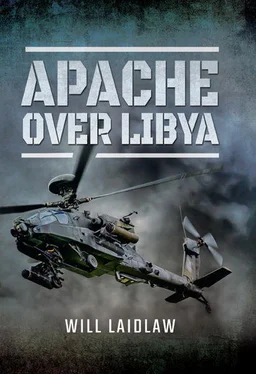The scale and importance of the British operation in Afghanistan meant there was no spare capacity for any other activity. Everything was optimized for Helmand, every person, piece of equipment and way of working. Everyone in the Army had to expect to deploy there with only a year or so between coming home and getting on the bus again. The Attack Helicopter Force was no different. Since that first brutal summer with 16 Air Assault Brigade in 2006, its six squadrons had rotated through Helmand, doing five months on the line followed by a year at home, before getting ready to go again. The Apache itself never left. It flew every day and night throughout the province, wherever British soldiers needed its support. Six squadrons worked a well-worn rotation until November 2009, when change was forced upon us. Savings had to be made and we needed to rationalize training and operations, so 656 Squadron was next on the list again. I was training on the firing ranges in Arizona when the CO phoned me.
‘The situation has changed.’ This is military speak for ‘your planning has been overtaken by someone else’s decision, so stand by to re-plan’.
‘You have a challenge; we are changing your role. No more Afghanistan for 656. You will deliver front-line operational training and I want you to reinvigorate a contingent capability with anything you have left.’
We had only trained for Afghanistan, and I had planned accordingly. Now we were going to run the training and develop ideas for a war that might come next. Our first Apache squadron not being on current operations was unthinkable. The first British Apache squadron, the first one into Afghanistan, the one that flew the Jugroom Fort [1] A daring mission in January 2007 to recover a fallen Royal Marine in which the Apaches flew with rescuers sitting on the wings of the aircraft
mission, was closing that part of its operational history and could be beginning another.
In a parochial sense I was disappointed not to be part of the Afghanistan cycle. I had always wanted to be in the Apache programme, and selection for command of a front-line squadron came with the assumption that operations in Afghanistan would be part of the tour. But the situation had changed, we had a lot of work to do and, while others could not, we could see the opportunity in this role. Military operations in Afghanistan would not last forever and we needed to be ready for what came next. Although we were not to know it, 656 squadron was once more about to pioneer a new way in military aviation.
By 2010 there was senior military acknowledgement that, while Afghanistan was the top priority, we needed to be ready for whatever came next. For the majority of the Army what came next was another tour of Afghanistan. Encouraging the consideration of a contingent capability beyond our Afghan responsibility was an uphill challenge. As I searched for support for my part in the project it became abundantly clear that the top priority was the only priority and anything else was to be taken at risk.
So effective was the communication that everything must be optimized for success in Afghanistan that my wish to challenge for scant resources was regarded as trivial, or worse, counter-productive. The ‘didn’t you get the memo?’ attitude was extraordinary. ‘What are you doing that for?’ was frequently asked. Preparing for something that was not real, that was not currently on our plate, was going to be painful. To me it seemed we were losing our imagination. I was forced to think new thoughts, to talk about operations other than Afghanistan. There were a number of individuals, many of them senior, who recognized the importance of developing a capability for the future, but at this stage of the Herrick campaign they were considerably outnumbered by those who could not afford to think beyond the next Afghan deployment. They had to train, deploy, fight and come home, then repeat. The Afghanistan rotation had harnessed the energy and, in some cases shackled the thoughts, of many who went there. By 2012 a wholesale military reset for the Army embraced contingent operations, but in 2010 in the Attack Helicopter Force it felt like 656 was on its own.
We had not needed to think about how we could work elsewhere in a different scenario, with a different threat. From an attack helicopter perspective it seemed to me that we had become comfortable operating out of the reach of dangerous weapons, where acting with total freedom was the expectation. We had a generation of aircrew who had spent years in Afghanistan and had grown into very experienced and capable operators in most respects; but due to the tempo and nature of that operation other skills had been allowed to wither. The hard-to-learn and easy-to-lose skills involved in defending and fighting the aircraft in a hostile environment, skills we did not need in an Apache in Afghanistan, had become just ten per cent of the training course. These skills were to become ninety per cent of what we needed over Libya. Being ready for whatever came next was wise. Breaking through the layers of ‘Afghanistan is the only war’ thinking was going to be difficult.
Conflict is unpredictable. It often arrives quietly and by surprise. And all you have to respond with is what comes to hand. You cannot wish more people, planes, ships, helicopters, guns, tanks or whatever out of thin air. Conflict is a come-as-you-are activity. This uncertainty requires agility – warriors in the current war who know that there will be a different war tomorrow. Conflict moves quickly, it is changeable. Conflict finds a new way, a new weapon, a different geography and new recruits. The bellicose persuasion of the human condition will not wait for you to agree with it or realize it needs to be fought. Conflict chooses you. Politicians and soldiers must be ready for it, whatever it may be. When fully committed to one specific conflict there is often little opportunity to consider how to deal with what might come next. In 2010 we had, in a small way, been given the chance to explore this with the Apache and present a case for new and unusual ways of using the aircraft outside its role in Afghanistan.
My priority was training front-line aircrew for Afghanistan. My second task was ‘everything else, if you have anything left’. It was clear that if I had anything left it should be taken to provide for Afghanistan, whether it was needed or not. At times it felt like 656 was regarded as a training provider that must be kept in its place. If the squadron started to do anything other than priority number one it was somehow denying a crucial resource that should be taken and used in Helmand.
Our training task was demanding for soldiers and planners, but not overly complex. It had been running for six years. The resources were known, the standards were understood and it was a question of balancing the number of instructors available to teach, the right number of aircraft to conduct the sorties and the willingness of the Great British weather to allow training to be completed. The Apache combat training course, known as Conversion to Role, or CTR, lasts eight months and is as demanding as the preceding eight months learning to fly the machine. Several years of Afghanistan experience had been reinvested in instructors of exceptional quality, resulting in a CTR syllabus that was Afghanistan-focused and delivered to the highest standard. This is a tough course, but the exacting standards are necessarily high; the ongoing operational context served as a daily reminder of this. Crews in training conducted their planning alongside crews completing their final preparations prior to deploying to Afghanistan. They all attended post-operational conferences together, and the CTR students knew that if they maintained the right standards they too would be in Afghanistan in a matter of months. Combat training has never been better informed or delivered, and the product was well worth the investment.
Читать дальше












